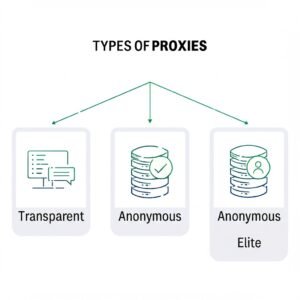When it comes to browsing the internet, speed is everything, right? We all want to stream movies in HD, browse through social media without a hitch, and get our work done quickly. But what if something as simple as a proxy server could be slowing down your internet connection? It’s a question I’ve asked myself, and chances are, you’ve thought about it, too. So, does proxy slow down the internet? Let’s dive into this together and see how proxies impact your online speed.
Key Points:
- Proxies can introduce latency, but the impact varies.
- The quality of the proxy server matters.
- Proxies sometimes offer benefits like better security or privacy.
How Proxy Servers Work
To understand whether a proxy slows down your internet, we first need to understand what a proxy server actually does. Think of a proxy as a middleman between your device and the internet. When you use a proxy, your computer doesn’t directly connect to a website. Instead, it sends the request to the proxy server, which forwards it to the website on your behalf. The response then travels back through the proxy before reaching your device. It’s a little like passing a note through a friend before it gets to you – there’s an extra step involved.
But does this extra step affect your internet speed? Let’s break it down.
The Impact of Proxy Servers on Internet Speed
Does a Proxy Slow Down the Internet?
I’ve used proxies a few times for various reasons—whether for accessing region-locked content or boosting privacy. And, honestly, it’s a mixed bag. Sometimes, yes, a proxy can slow down your internet. The reason? Latency. Since your request goes through the proxy server, it adds an additional step to the data journey. This extra time can cause noticeable delays, especially when you’re trying to load a website or stream content.
The thing is, not all proxies affect speed the same way. Let’s take a deeper look at the factors that determine whether your proxy will slow things down.
Key Factors That Affect Proxy Speed
- Proxy Server Quality: Not all proxies are created equal. A high-quality proxy (like a premium residential proxy) can handle multiple requests with minimal delay. On the other hand, free proxies or low-quality servers often struggle with heavy traffic and limited bandwidth. I’ve found that free proxies, in particular, tend to slow things down a lot.
- Geographical Distance: Another factor that impacts your internet speed is the distance between you and the proxy server. Let’s say you’re in the U.S. and using a proxy located in Europe. Your data has to travel across the ocean, which increases latency. The further the proxy, the slower the connection.
- Network Congestion: This one is important. When too many people are using the same proxy server, it can become overloaded. Just like how a crowded highway causes traffic jams, an overloaded proxy results in slower speeds. This is something I’ve noticed when using free proxies that have too many users connected.
Can a Proxy Server Improve Speed?
Wait a minute! Didn’t we just say that proxies slow things down? Well, it’s not all bad news. There are times when proxies can improve Internet speed. For example, a proxy that caches frequently accessed websites can make loading those sites faster since the content is saved and doesn’t need to be fetched from the web every time. If you’re using a proxy located close to you, and it’s configured well, you might experience a slight boost in speed for certain activities like web browsing.
Proxies vs. VPNs: Which Is Better for Internet Speed?
Now, some people might wonder, “Should I just use a VPN instead?” Well, that’s a fair question! VPNs (Virtual Private Networks) and proxies serve similar functions but in slightly different ways. A VPN encrypts your entire internet connection, while a proxy just reroutes traffic. Here’s the catch: VPNs tend to slow down your internet more than proxies because of the extra encryption layer. But if speed is your top priority, proxies might offer a better option for unencrypted browsing.
So, when should you use a proxy, and when is a VPN the better option? Let’s consider the situations:
- Use a Proxy: If you need a simple solution for bypassing geo-restrictions or want a slight speed boost for browsing, a proxy might be your best bet.
- Use a VPN: If privacy and security are your main concerns or you want to encrypt your traffic, go with a VPN. Just be aware that it might slow things down a bit more.
How to Minimize Proxy-Induced Slowdowns
It’s not all doom and gloom when using proxies. There are ways to optimize proxy performance and reduce any speed loss.
Choosing the Right Proxy for Speed
The first step is choosing the right proxy. I’ve learned the hard way that free proxies often lead to frustratingly slow speeds. Instead, go for premium proxies that are well-maintained and have multiple locations. Residential proxies, in particular, tend to have faster speeds compared to data center proxies because they’re less likely to be overloaded.
Optimizing Proxy Settings for Better Performance
Another key tip is to optimize your proxy settings. You can configure your device to connect to a proxy server that’s closer to your geographical location. If you’re in New York, for instance, it’s better to choose a proxy server in the U.S. rather than one in Europe.
Alternative Methods to Improve Internet Speed with Proxies
Some proxies also have caching features. This can make a huge difference. Cached content means websites load faster since the proxy already has some of the website data stored. In the long run, this can significantly improve the user experience, especially when revisiting familiar sites.
Common Misconceptions About Proxies and Internet Speed
There’s a lot of misinformation floating around about proxies, especially when it comes to their impact on speed. For instance, a common myth is that all proxies slow down your internet. That’s just not true! While proxies can introduce some latency, well-managed, premium proxies can actually enhance your experience in terms of speed and security.
Another misconception is that proxies are always a bad choice for speed. In reality, when used correctly, proxies can reduce traffic load, speed up connections for specific tasks, and even improve your online security.
Conclusion
To wrap it up: Yes, proxies can slow down your internet, but the degree of slowdown really depends on the type of proxy you use, its location, and the quality of the service. If you’re looking to maintain speed while improving security, choosing the right proxy is key. While a VPN might be better for privacy, a proxy can be a great tool if configured correctly and used in the right circumstances.
At the end of the day, the decision comes down to your personal needs. Just remember: Not all proxies are created equal, and with the right one, you might find your browsing experience faster and more secure than ever.
FAQ
Q1: Do free proxies slow down internet speed more than paid ones?
Yes, free proxies often slow down your internet because they are typically overloaded with users and have limited resources.
Q2: Can I use a proxy to speed up browsing during high-traffic times?
A well-configured proxy, especially with caching, can speed up your browsing by storing frequently accessed content.
Q3: How do I know if my proxy server is overloaded?
If websites are taking much longer to load than usual or your connection drops frequently, your proxy may be overloaded.
Q4: Are there any proxies that don’t slow down internet speeds?
Premium proxies or residential proxies are less likely to slow down your internet, provided they are well-maintained.
Q5: What’s the best proxy for faster internet?
Residential proxies or premium paid proxies with multiple server locations generally offer the best speed.
Q6: Will using a proxy slow down streaming speeds?
Proxies can cause slower streaming speeds due to added latency, but using a high-quality proxy located closer to you can help reduce this.
Q7: Should I use a VPN or a proxy for faster internet?
For faster speeds, proxies are typically better, especially if you don’t need the encryption offered by a VPN.
Learn how proxies can affect your internet speed. Understand the factors that slow down or speed up your connection and how to optimize it for better performance.

i want to write a author box bio, my site based on ppmcalculator.com. provide me a short Biographical Info
2/2


